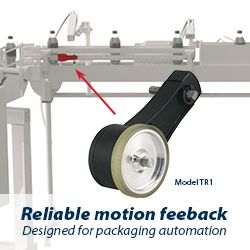Impossible Objects Introduces 3D Printed PEEK Polymer Carbon Fiber Composite Parts
Addition of PEEK to revolutionary 3D printing process brings carbon fiber closer to replacing metals in manufacturing
NORTHBROOK, Ill., July 12, 2016 /PRNewswire/ -- Impossible Objects has added PEEK (polyetheretherketone), one of the highest performance thermoplastics available, to its 3D printing offering marking the first time that geometrically complex, strong and light carbon fiber composites using PEEK can be 3D printed.
Since PEEK offers outstanding heat and chemical resistance in addition to greater strength, the combination of PEEK and carbon fiber produces parts with properties that previously were unattainable. CBAM PEEK parts perform more than 30% better than standard CBAM parts with tensile strength of 205 MPa (29,700 psi) and heat resistance of 250°C (482°F). Customers can now enjoy the complex geometries, speed, strength-to-weight ratios and cost advantages of carbon fiber 3D printing with the durability and resistance to high temperature typically found in metals. These new parts hold the ability to revolutionize manufacturing in the aerospace, medical, automotive and machine tooling industries.
"Plastic-based 3D printing has not been able to compete with metals because of temperature resistance and strength. Now we can produce parts that begin to compete with metals in these areas, while having better strength-to-weight ratios than some metals," said Impossible Objects CEO Larry Kaplan. "Our mission is to bring 3D printing into the mainstream of higher volume, lightweight, high-performance part manufacturing. Adding PEEK to our roster of printable materials is a major step toward that goal."
Unmatched Performance
PEEK parts printed with Impossible Objects' process have considerable advantages over parts made of machined aluminum and other traditional and 3D printed plastics:
PEEK parts made with Impossible Objects' 3D printing process are more than 50% lighter than comparable aluminum parts but demonstrated two-thirds ultimate strength, at 205 MPa versus 310 MPa for Aluminum 6061-T6.
PEEK polymers can be recycled with Impossible Objects' new 3D printing process, overcoming significant issues around expense, waste, and inefficiency associated with PEEK polymers in traditional manufacturing and 3D printed manufacturing. Eliminating PEEK wastage in Impossible Objects' process enables substantially lower cost 3D printed parts.
3D printed carbon fiber composite PEEK parts are available today from Impossible Objects.
First Truly New 3D Printing Process in More Than 20 Years
The Impossible Objects composite-based additive manufacturing process (CBAM) is the first truly new 3D printing process in more than 20 years. Conventional thermal inkjet heads are used to "print" designs on sheets of composites, like carbon fiber, Kevlar or fiberglass. Each sheet is then flooded with a polymer powder, such as nylon or PEEK, causing the powder to stick where inkjet fluid has been deposited on the sheets. Excess powder is vacuumed off and the sheets are stacked, compressed and heated. The polymer powder melts and bonds the sheets together. The uncoated fibers are then mechanically or chemically removed, and what remains is an exceptionally durable, lightweight object that was previously impossible to make so quickly and inexpensively.
"These advances of speed and material properties will allow additive manufacturing to change how things are made," said Robert Swartz, chairman and founder of Impossible Objects. "Our focus on making functional parts, not just prototypes, stems from our proprietary materials sciences breakthroughs, which provide our process with advantages over other 3D approaches, including strength and speed."
The process yields geometrically complex parts with the strength-to-weight ratio of metals that are ideal for use cases where having light parts without sacrificing strength is critical, including aerospace, aviation, defense, oilfield services, automotive, and performance athletics. The parts can be up to 10x stronger at production speeds scalable to 100x faster, using a wider range of materials, including carbon fiber, Kevlar and fiberglass. CBAM parts also have air- and water-tight features. CBAM parts composed of carbon fiber and nylon have tensile strength of 150 MPa (21,700 psi) and heat resistance of 120°C (248°F), while those made with PEEK perform more than 30% better with tensile strength of 205 MPa (29,700 psi) and heat resistance of 250°C (482°F). Watch a video of the prototype machine here: http://impossible-objects.com.
"Our long-term goal is to compete with machining and injection molding," Swartz said. "We have a multi-year roadmap to realize additively manufactured parts on par with those made through traditional manufacturing methods, such as injection molding, machining and die-casting."
About Impossible Objects
Impossible Objects LLC was founded in 2009 with the expectation that materials sciences inventions would enable 3D printing to revolutionize the world in the same ways that computers and the Internet have revolutionized the way we live, work and play. Impossible Objects is backed by OCA Ventures and is staffed by a multidisciplinary team with extensive experience in manufacturing, additive manufacturing, materials sciences, aerospace, composite materials and engineering, and developing and commercializing new technologies. www.impossible-objects.com
Featured Product

Model TR1 Tru-Trac
The Model TR1 Tru-Trac® linear measurement solution is a versatile option for tracking velocity, position, or distance over a wide variety of surfaces. An integrated encoder, measuring wheel, and spring-loaded torsion arm in one, compact unit, the Model TR1 is easy to install. The spring-loaded torsion arm offers adjustable torsion load, allowing the Model TR1 to be mounted in almost any orientation - even upside-down. The threaded shaft on the pivot axis is field reversible, providing mounting access from either side. With operating speeds up to 3000 feet per minute, a wide variety of configuration options - including multiple wheel material options - and a housing made from a durable, conductive composite material that minimizes static buildup, the Model TR1 Tru-Trac® is the ideal solution for countless applications.
